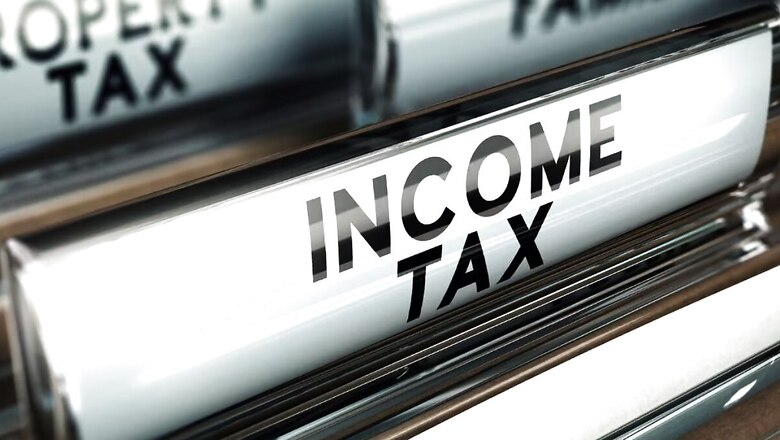
views
Budget 2024 Expectations Income Tax: The budget for 2024 (fiscal year 2024-25) is set to be presented today, July 23rd, 2024. There’s a lot of anticipation surrounding income tax changes, particularly for middle-class taxpayers.
Today we bring to you a trend-check around changes in income tax in the last three Union Budgets and some of the commonly anticipated modifications in Budget 2024.
Income Tax Changes in Union Budget 2021
Key Highlights of Budget 2021
- No Major Changes: There were no significant changes in income tax slabs or rates for individuals.
- Senior Citizens: Individuals aged 75 years and above with only pension and interest income were exempted from filing income tax returns.
- Tax Audit Limit: The tax audit limit was increased from Rs5 crore to Rs10 crore for those who carried out 95% of their transactions digitally.
- Affordable Housing: The additional deduction of Rs1.5 lakh for interest paid on loans taken for affordable housing was extended for one more year.
- Exemption for Covid-related payments: Introduced tax exemption for medical expenses related to Covid-19 illness.
- Extended ITR filing revision period: Increased the time limit for filing a revised Income Tax Return (ITR).
Income Tax Changes in Union Budget 2022
Key Highlights of Budget 2022
- No Changes in Slabs: There were no changes in the income tax slabs or rates.
- Updated Return: An updated return could be filed within 2 years from the end of the relevant assessment year on payment of additional tax.
- Digital Assets: A 30% tax on income from the transfer of virtual digital assets (VDAs), with no deduction except the cost of acquisition. A 1% TDS was introduced on payments made for the transfer of VDAs.
- National Pension Scheme (NPS): Tax deduction limit for state government employees was increased to 14% from 10%.
- LTCG surcharge capped: Capped the Long-Term Capital Gains (LTCG) surcharge at 15%, benefiting those with higher capital gains.
- Deduction for disabled dependents: Allowed a lump-sum deduction for investments in annuity schemes to secure the future of disabled dependents.
Income Tax Changes in Union Budget 2023
Key Highlights of Budget 2023
- New Tax Regime Changes: The new tax regime became the default regime.
- Increased tax rebate under Section 87A (new regime): Increased the tax rebate under Section 87A to Rs. 25,000 for taxable incomes up to Rs. 7 lakhs, effectively making income tax zero for many in this bracket (new regime).
- Increased tax slabs and exemption limit (new regime): Raised the basic exemption limit and increased tax slabs under the new regime, benefiting lower and middle-income earners.
Tax Slabs (New Regime):
Rs 0 – Rs 3 lakh: Nil
Rs 3 – Rs 6 lakh: 5%
Rs 6 – Rs 9 lakh: 10%
Rs 9 – Rs 12 lakh: 15%
Rs 12 – Rs15 lakh: 20%
Above Rs15 lakh: 30%
- Standard Deduction: A standard deduction of Rs 50,000 was introduced under the new tax regime.
- Reduction in Surcharge: The highest surcharge rate was reduced from 37% to 25% for income above Rs5 crore.
- Leave Encashment: The limit for tax exemption on leave encashment on retirement for non-government salaried employees was increased to Rs 25 lakh.
Budget 2024 Expectations Income Tax | Taxpayer Expectations
Experts have called for relief in income tax and urged for changes in tax slabs.
Increased exemption limit or revised tax slabs: Many expect the government to raise the basic exemption limit, possibly from the current Rs 3 lakh to Rs 5 lakh. There might also be adjustments to the income tax slabs under the new tax regime.
Increasing Tax Exemption
Krishan Mishra, CEO, FPSB India, urged, “With rising incomes, increasing the tax exemption limit from Rs 7.5 lakh to Rs 10 lakh will be a crucial step to encourage savings and investments among the mid-income group. It will provide much-needed relief to taxpayers and stimulate financial planning.”
Emphasising the importance of health and life insurance in the budget, Mishra added that beyond just tax savings, it will help people understand the importance of the two investments.
“If the Finance Minister highlights this, it can educate the masses on the necessity of insurance for financial security, rather than just a tax-saving tool,” Mishra noted.
Making the New Regime Attractive
Prof. Sangita Dutta Gupta, Professor of Economics, BML Munjal University, highlighted that salaried taxpayers have not embraced the new tax regime fully.
“The new tax regime may still be good for income below Rs 15 lakh. However, there is no inflation adjustment above Rs. 15 Lakh. Thus, taxpayers in the high-income bracket prefer the old regime over the new one. It would be helpful if a tax rate of 30% were imposed on incomes above Rs 25 lakh. It will make the new tax regime attractive and at the same time propel consumption and savings,” Gupta said.
Section 80C Limit
Mitesh Jain, Partner at Economic Laws Practice pointed out that salaried individuals who opt for the old tax regime will benefit from an increase in Section 80C limits as it may reduce their tax liability depending upon the tax bracket.
“Assuming that the tax slabs are not tweaked in the budget, for an individual having gross total income of Rs 10 lakhs or Rs 15 lakhs, the old regime would be beneficial if aggregate deductions are more than Rs 2,62,500 and Rs 3,75,000 respectively. Therefore, with increased Section 80C limits, more taxpayers may opt for the old tax regime as it would be easier to achieve break-even deduction contributions,” Jain said.
Other Expectations
Standard deduction hike: The standard deduction, which reduces taxable income, might be raised from the current Rs 50,000.














Comments
0 comment